
I am honoured to present this mid‑year update as the Executive Director of the Helen Suzman Foundation.
This edition highlights key victories and initiatives such as our successful challenge to provisions of the Refugees Act that risked undermining children's rights; the reinstatement of judicial oversight over the Zimbabwe Exemption Permit (ZEP) and our continued intervention in apartheid‑era accountability cases. We have also strengthened our presence at national events, including the Human Rights Festival and commemorations honouring stalwarts like Ahmed “Uncle Kathy” Kathrada.
Through strategic litigation, thoughtful submissions, and public engagement, HSF remains steadfast in championing the values of equality, freedom, and dignity for all.
 Naseema Fakir
Naseema Fakir
Litigation Update
Scalabrini Centre of Cape Town/Minister of Home Affairs
The Helen Suzman Foundation (HSF) welcomed the recent Western Cape High court judgment declaring certain provisions of the Refugee Act No. 30 of 1998 invalid and unconstitutional. The judgment followed an application by the Scalabrini Centre for Cape Town that sought an order declaring sections 4(1)(f), 4(1)(h), 4(1)(i), and 21(1B) of the Refugees Act No.130 1998, and regulations 8(1)(c)(i), 8(2), 8(3) and 8(4) of the Refugees Regulations 2019 unconstitutional because they risk sending applicant's for refugee status back to unsafe countries, before their applications have been properly determined.
HSF represented by Norton Rose Fulbright joined the matter as amicus curiae to make submissions on how the impugned provisions negatively impact on the rights of children of asylum seekers. In its judgment, the Court agreed with HSF stating that “the impugned provisions are not capable of an interpretation that protects the best interests and dignity of children in their own right. In fact, children have no say in determination at all.” Moreover, the Court agreed with HSF’s position that the impugned provisions are not consistent with standards set out in the United Nations Convention on the Rights of the Children and the African Charter on the Rights and Welfare of the Child which guarantee the right for the child to have his/her own best interests taken as a primary consideration.
HSF sees this judgment as not only a victory for the children of asylum seekers but more consistent with the spirit of the constitution in protecting the rights of a particularly vulnerable group of persons - children.
The judgment can be read here.
HSF / Minister of Home Affairs [ZEP Case Update]
HSF’s successful challenge to the attempted termination of the Zimbabwe Exemption Permit (ZEP) in 2022 remains significant in 2025. The court order secured by HSF requires the Minister of Home Affairs to undertake a fair and rational consultation process before deciding the ZEP’s future. In 2024 the newly appointed Minister, Dr Leon Schreiber, announced the establishment of the Immigration Advisory Board (IAB) to ensure compliance with the court order. In April 2025 the IAB was formally constituted. HSF welcomes the establishment of the Board and in particular, the appointment of James Chapman, Head of Advocacy and Legal Advisor at the Scalabrini Centre of Cape Town, as one of its members. HSF now awaits the implementation of the required consultation process without which the ZEP cannot lawfully be terminated.
HSF continues to support ZEP holders facing legal uncertainty and misinformation. In 2024, HSF formalised internal systems to better manage the high volume of requests for assistance, establishing an online form and a range of pro forma legal letters.
HSF continues to provide this support in 2025. These letters have assisted ZEP holders in accessing critical services such as banking and driver’s licenses and have also provided assurance to employers that ZEP holders have the legal right to reside and work in South Africa. Through this advocacy, HSF seeks to ensure that ZEP holders can continue to live and work with dignity while the process around the permit’s future remains ongoing.
HSF Admitted as Amicus Curiae in Calata and Others v Government of RSA and Others
On 22 May 2025 HSF represented by Norton Rose Fulbright was admitted as amicus curiae into litigation concerning the State’s failure to prosecute apartheid-era crimes that have gone unpunished for decades. The litigation, brought by several families affected by this ongoing failure, is supported by the Foundation for Human Rights as co-applicants. The parties seek twofold relief: (i) constitutional damages for the state’s failure to bring prosecutions of the crimes at issue; and (ii) a commission of inquiry into why the state has failed to do so. As amicus curiae, HSF makes submissions highlighting the right to truth – a right borne not only by the families of the victims of apartheid-era crimes, but by the South African public at large. HSF also emphasises the duty incumbent upon domestic courts to ensure the prosecution of crimes against humanity, including apartheid.
HSF’s court papers in this matter can be found here
Events
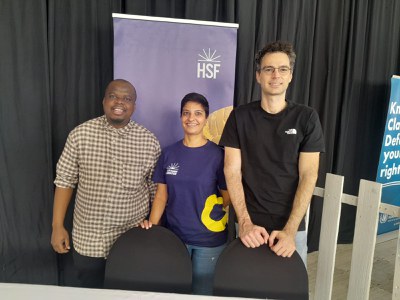 2025 Human Rights Festival
2025 Human Rights Festival
On 21 and 22 March 2025 HSF took part in the 2025 Human Rights Festival held at Constitution Hill. This lively event, which brings together both local and international organizations, featured our team showcasing recent initiatives and distributing educational resources. We were also honoured to highlight the legacy of our patron, Helen Suzman at the event.
30 Years of Constitutional Court
On 23 June 2025 our Executive Director attended the 30th anniversary celebration of the Constitutional Court in Johannesburg. The event featured speeches by President Cyril Ramaphosa, the Minister of Justice and Constitutional Development, former Chief Justices, as well as both retired and sitting judges, justices and legal practitioners. Regional judges also delivered addresses. In his remarks, the President emphasized that as we mark this important milestone, we must honour the Court’s proud legacy by working together across all sectors of society to fully realize the promise of our Constitution.
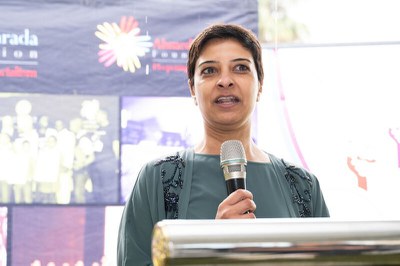 Remembering Uncle Kathy
Remembering Uncle Kathy
On 28 March 2025 HSF Executive Director Naseema Fakir joined the remembrance event in honour of late struggle stalwart Ahmed “Uncle Kathy” Kathrada at the West cemetery. Organized by the Ahmed Kathrada Foundation, the event marked the anniversary of the passing of Uncle Kathy, where different stakeholders including political parties, civil society organisations and friends came to honour the legacy of the struggle icon.
Fakir shared her reflections on the importance of still drawing on Uncle Kathy’s commitment to non-racialism under the new government of national unity.
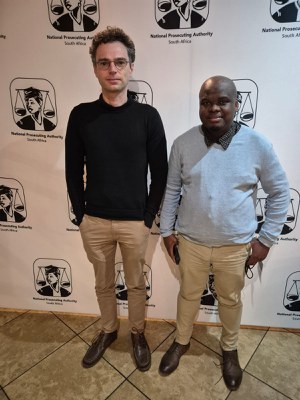 NPA/CSO Engagement Roundtable
NPA/CSO Engagement Roundtable
On 25 April 2025 HSF participated in the roundtable discussion between the National Prosecuting Authority (NPA) and civil society organizations in Pretoria. HSF researchers Ezekiel Kekana and Christopher Fisher represented HSF at the roundtable where NPA’s National Director of Public Prosecutions, Shamila Batohi shared with members of the civil society about some setbacks that the NPA has faced in recent times. HSF specifically asked Batohi about the NPA’s mishandling of the Timothy Omotoso case.
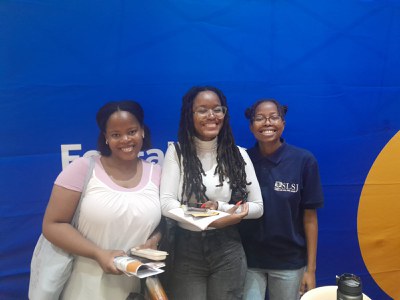 University of Pretoria Career Fair
University of Pretoria Career Fair
On 14 March 2025 HSF participated in the 2025 law career fair at the University of Pretoria. HSF researchers Ezekiel Kekana and Luke Oosthuizen shared with law students career opportunities that are available in civil society. Students who visited our stall received free constitutions and educational material about Helen Suzman.
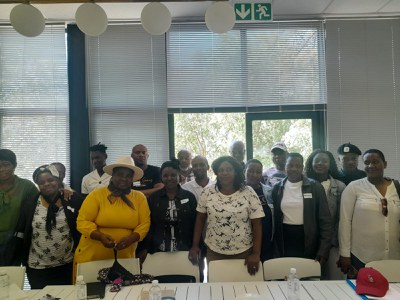 HSF Hosts ZEP Workshops
HSF Hosts ZEP Workshops
HSF hosted three workshops with leaders from the Zimbabwean Exemption Permit (ZEP) community in October 2024, February 2025, and May 2025. These workshops brought together community representatives from across the country to discuss the challenges faced by ZEP holders, explore possible solutions and review the status of the Immigration Advisory Board (IAB) and the broader consultation process as mandated by the June 2022 court order obtained by HSF.
These engagements have proven to be extremely valuable both for the ZEP community and for HSF as they help ensure that we remain responsive to the lived realities of permit holders. The workshops have also played a critical role in addressing misinformation and disinformation surrounding the validity of the ZEP and have enabled us to provide accurate information and assistance to individuals where possible.
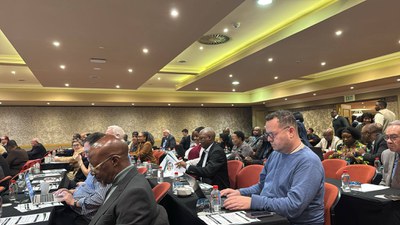 HSF at the Electoral Reform Conference
HSF at the Electoral Reform Conference
HSF researchers Ezekiel Kekana, Luke Oosthuizen and Christopher Fisher attended a two-day Electoral Reform conference in Kempton Park, Ekurhuleni. The conference which was organized by Advocate Richard Sizani led Electoral Reform Consultation Panel (ERCP) and attended by representatives from civil society, political formations, community groupings, and members of Parliament among others, discussed possible electoral reforms options that will be presented to Parliament later this year. The ERCP is expected to hand over its final report with three or more possible options on electoral reforms to the Minister of Home Affairs in September 2025.
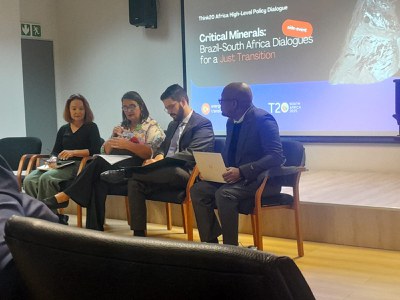 HSF researchers at the Critical Minerals Dialogue
HSF researchers at the Critical Minerals Dialogue
On 30 April 2025 HSF researchers Ezekiel Kekana and Christopher Fisher attended a high-level policy dialogue on critical minerals at the Brazilian Embassy in Pretoria. The dialogue which was part of the progamme of the Think20 Africa, discussed the environmental impact of critical minerals in both South Africa and Brazil and the importance of moving fast to clean energy. The dialogue was attended by members of civil society, the diplomatic community, academics and researchers, with the Brazilian ambassador to South Africa, Benedicto Fonseca Filho delivering the address.
Submissions
Joint Submission: Discussion Paper on South Africa’s Bail System
Lawyers for Human Rights (LHR) and HSF made joint submissions in response to the South African Law Reform Commission’s Discussion Paper 167, which explores reforms to South Africa’s bail system. South Africa’s prison population, particularly those awaiting trial, has increased at a rate that places a significant burden on the State. The way South Africa regulates its bail system has a significant impact on the size of this population and is therefore in desperate need of reform. To this end, HSF and LHR proposed several legislative reforms aimed at reducing the population of remand detainees, including reforms related but not limited to: delayed trials and bail applications; affordability of bail; verification of the particulars of the accused; and alternatives to detention.
The submissions can be read here.
The discussion paper can be read here.
Discussion Paper on Non-Trial Resolutions for Crimes of Corruption
HSF made submissions in response to the South African Law Reform Commission’s Discussion Paper 165, which proposes that South Africa adopt a statutory regime of non-trial resolutions (NTRs) for certain crimes of corruption by corporate entities and individuals. NTRs come in many forms but they are all agreements between a would-be corruption accused and the state which trade-off criminal liability for: (i) cooperation in further investigation of the crimes at issue, (ii) a negotiated financial penalty, and (iii) reshaping a would-be accused’s behaviour to prevent future corruption. HSF argued that NTRs are premature in South Africa until the National Prosecuting Authority (NPA) has strengthened its capacity to incentivise NTRs that prioritise the public interest. However, if a statutory NTR regime is introduced in the short term, HSF argued that NTRs should be subject to rigorous judicial oversight and strict conditions with the starting point being the NPA’s current policy framework on NTR’s.
HSF’s full submission can be read here.
The Discussion Paper can be read here.
Submission on the National State Enterprises Bill
HSF made a submission in response to the National State Enterprises Bill. The Bill seeks to form a holding company, controlled by the Presidency and to transfer thirteen critical State-Owned Enterprises (SOEs) to that holding company. In its submission, HSF warned that the Bill does not insulate SOEs from undue political influence but made several suggestions on how to mitigate the Bill’s risks, if it is to remain government policy.
HSF’s submission can be read here.
The Bill can be found here.
HSF in the Media
‘Time for GNU to seriously tackle GBV and the provision of water’
‘Court admits Helen Suzman Foundation as amicus curiae in apartheid litigation’
‘Refugees Act case: Helen Suzman Foundation applies to be a friend of the WC High Court’

